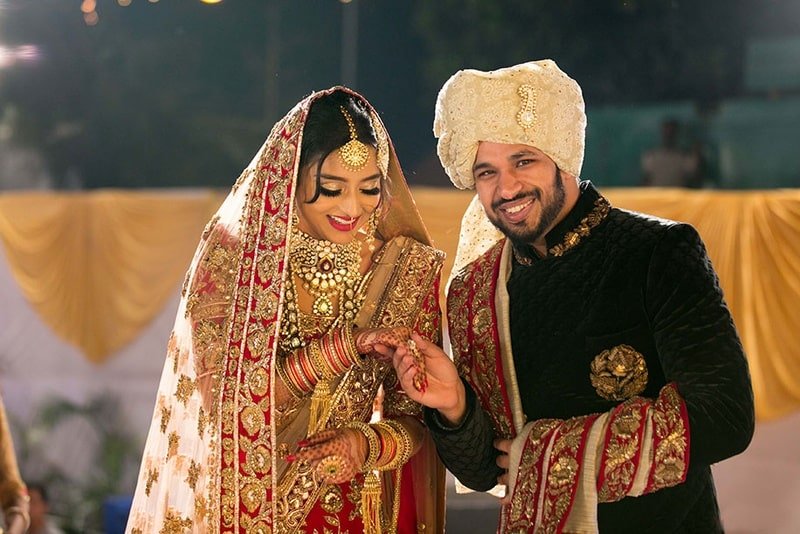Online Nikah Service | Online Nikah Service for Pakistani
Welcome to OnlineNikah.net: Where Love Knows No Boundaries
At OnlineNikah.net, we believe that love transcends distance and that couples should be able to unite in marriage regardless of where they are in the world. Our Online Marriage services are designed to bring couples together in a meaningful and legally binding union, ensuring that the bonds of love are never restricted by geographical boundaries
Why Choose Online Nikah in Pakistan?
Online Nikah is the modern solution to an age-old tradition. Here’s why choosing our online Nikah service in Pakistan is a great decision:
Convenience: Say goodbye to long queues and paperwork. With our online service, you can complete the Nikah process from the comfort of your home.

Accessibility: No matter where you are in Pakistan, our service is just a click away. You can access it from any device with an internet connection.
Expert Guidance: Our team of experienced Nikah scholars is here to guide you through the process, ensuring it adheres to Islamic principles and Pakistani legal requirements.
Global Reach, Local Sensibility: Our Online Nikah services, At OnlineNikah.net caters to couples from diverse cultural backgrounds and various parts of the world. Whether you’re in the same city or continents apart, our Online Marriage services are accessible to you.
Security: Rest assured, your information is kept secure and private throughout the process.
Meaningful Ceremonies, Memorable Moments: Your Online nikah ceremony with OnlineNikah.net is not just a legal formality; it’s a meaningful and spiritual experience. Our qualified Nikah Khwans conduct the ceremony with reverence and sincerity, ensuring that every ritual is performed with the utmost respect for tradition.
Exploring the Concept of Online Nikah in Islam
Online Nikah, also known as E-Nikkah or Digital Nikah, is a contemporary adaptation of the conventional Islamic marriage ceremony, leveraging digital platforms and technology to facilitate the marriage contract process. It ensures accessibility to Muslims worldwide, breaking geographical barriers.
The essence of Online Nikah remains deeply rooted in Islamic Shariah laws, emphasizing key principles such as the consent of both parties, the presence of witnesses, and the recitation of specific Quranic verses.
Unlike traditional Nikah ceremonies that require physical presence, Online Nikah allows couples, Islamic scholars, and witnesses to participate virtually through video conferencing platforms, enabling real-time interaction and contribution to the tradition.

Significance of Online Nikah is crucial in appreciating its role in contemporary Islamic practices:
Spiritual Validity: Online Nikah holds the same spiritual significance as a traditional Nikah ceremony, reaffirming the sacred bond between a husband and wife within Islam.
Accessibility: Online Nikah addresses challenges related to distance and busy schedules, providing a solution for couples who might find it difficult to participate in a traditional Nikah ceremony.
Flexibility: Online Nikah introduces flexibility into the marriage process, aligning it with the realities of modern life. It allows couples to fulfill their religious obligations without stress or inconvenience.
Global Reach: Online Nikah transcends geographical boundaries, enabling Muslims from diverse backgrounds to unite in marriage while upholding Islamic traditions. It serves as a unifying force among Muslims worldwide.
The Online Nikah Process Explained
Let’s delve into the intricacies of the Online Nikah process, highlighting the significance of each step and the utilization of pertinent terms:
Selecting a Trustworthy Islamic Platform
Before embarking on your Online Nikah journey, it’s vital to conduct in-depth research to find a reputable online platform specializing in Islamic marriage services. Consider the following factors:
- Reputation: Look for platforms with a strong standing within the Muslim community. Read reviews, testimonials, and seek recommendations from reliable sources to ensure the authenticity of your online nikah experience.
- Qualified Scholars: Opt for platforms that collaborate with experienced and highly qualified Islamic scholars for online nikah. These scholars play a pivotal role in guaranteeing the validity and adherence to Islamic principles throughout the Nikah ceremony.
- User-Friendly Tools: Evaluate the platform’s ease of use and the tools it offers for the Nikah process. A reliable platform should provide streamlined and hassle-free tools for couples participating in online nikah.
Choosing an Islamic Scholar for Your Online Nikah
Many Online Nikah platforms provide a choice of proficient Islamic scholars. Here’s a guide on how to make your selection:
- Credentials: Examine the credentials, qualifications, and experience of the scholars available. Seek out scholars who possess in-depth knowledge of Islamic marriage jurisprudence and have a solid track record in conducting online Nikah ceremonies.
- Availability: Verify the scholars’ availability and collaborate with them to identify a mutually convenient date and time for your Online Nikah ceremony.
How Online Nikah Works:
- Registration:Begin by registering on our user-friendly platform. Provide the necessary details and choose the date and time for your Online Nikah ceremony. Our team will guide you through the registration process, ensuring that you have a clear understanding of the steps involved.
- Documentation:Our experts will assist you in preparing all the required documents for your Online Nikah. We handle the paperwork, including the legal formalities, ensuring that your marriage is fully compliant with the law.
- Ceremony Preparation:Prior to your scheduled ceremony, our team will coordinate with you and your partner to ensure that everything is in order for Online Nikah. From technical checks to ceremonial preparations, we take care of all the details, allowing you to relax and focus on the significance of the day.

- Marriage Certificate: Once the Online Nikah ceremony is completed, we will assist you in obtaining your official marriage certificate. Whether you need a Nadra Marriage Certificate or a Union Council Marriage Certificate, we ensure that your certificate is valid, authentic, and recognized by the relevant authorities.
Legal Requirements for Online Nikah in Pakistan
Before embarking on the journey of marriage through our online Nikah service, it’s crucial to comprehend the legal prerequisites. At Online Nikah, we are dedicated to ensuring that your online Nikah in Pakistan is not only a religious ceremony but also a legally recognized union. Here, we outline the essential legal requirements for your understanding:
- Age Requirements: Both the bride and groom must meet the legal age criteria for online Nikah in Pakistan. Generally, the legal age for marriage is 18 years for both males and females, subject to local variations.
- Nikah Nama (Marriage Contract): The Nikah Nama is the official marriage contract and a pivotal document. It delineates the terms and conditions of the marriage, including the Mahr, the responsibilities of both parties, and any specific agreements. Our online Nikah service ensures accurate preparation and registration of the Nikah Nama.
- Witnesses: Islamic tradition mandates the presence of two adult Muslim witnesses during the Nikah ceremony. These witnesses must be of sound mind and character. Our online Nikah service assists in arranging suitable witnesses for your ceremony.
- Registration: After the online Nikah ceremony, the marriage must be registered with the relevant authorities. This step is crucial for obtaining legal recognition of your wedding. Our team ensures the online Nikah registration process is completed accurately and in compliance with local laws.
- Compliance with Local Regulations: Different regions in Pakistan may have specific marriage-related regulations. It’s essential to be aware of and adhere to any local requirements for online Nikah.

The Legal Framework of Online Nikah
Similar to traditional Nikah, Online Nikah holds significant religious importance in Islam. However, the legal regulations governing it differ from one country to another. While some nations recognize Online Nikah as a legitimate form of marriage, others do not. Therefore, individuals considering Online Nikah must be aware of the legal implications in their specific jurisdictions. In places where it is acknowledged, the process typically involves registering the marriage with the relevant government authorities after the online ceremony.A key legal concern revolves around the validity of consent in Online Nikah. According to Islamic law, both parties must willingly and knowingly agree to the marriage contract. In the digital realm, verifying the authenticity of consent can be challenging. Consequently, some jurisdictions require additional precautions, such as video conferencing or notarized documents, to confirm the consent of both parties.
Cultural and Societal Impact of Online Nikah
Engaging in Online Nikah holds substantial cultural and social implications. Across many cultures, weddings are grand and communal affairs, serving as occasions for families and communities to unite. Online Nikah, often conducted remotely and with minimal extravagance, challenges these conventional customs. Some perceive it as a departure from cultural traditions and rituals that have been passed down through generations.
Online Nikah has the potential to reshape family dynamics. Traditional weddings typically involve families taking a leading role in organizing and rejoicing in the event. However, Online Nikah might shift the spotlight more onto the couple, potentially reducing the involvement of extended family members. This shift can yield both positive and negative outcomes, empowering individuals to make independent choices while possibly straining relationships within the family.
Challenges and Disputes Associated with Online Nikah
Online Nikah faces significant challenges and controversies. One of the major concerns revolves around the authenticity of virtual ceremonies. The absence of physical presence makes it challenging to verify the identities of those involved, leading to doubts about the validity of consent and the potential for deceptive marriages. This issue has led some religious scholars and legal authorities to express reservations regarding Online Nikah.
Another worry pertains to the lack of oversight and regulation in the online marriage industry. With numerous websites and platforms offering online Nikah services, there is a risk of exploitation, fraud, and unethical practices. It is imperative for individuals considering Online Nikah to exercise caution, conduct thorough research, and select reputable providers
The Role of Technology in Facilitating Online Nikah
Technology plays a crucial role in making Online Nikah feasible. Video conferencing platforms, digital document signing, and secure online payment systems have revolutionized the way couples participate in Nikah ceremonies, enabling them to do so from any part of the world. The ease and accessibility that technology provides have transformed the marriage landscape, opening up new avenues for couples from diverse backgrounds and situations.
Moreover, technology has enhanced the customization options in Online Nikah ceremonies. Couples now have the freedom to choose their preferred officiant, whether it’s a local imam or a respected scholar from a different region. They can also tailor the ceremony to align with their cultural and religious preferences, adding to the richness and adaptability of Online Nikah.
Social Perception and Stigma Surrounding Online Nikah
Opinions regarding Online Nikah vary significantly across different societal groups. Some regard it as a pragmatic and contemporary solution that resonates with evolving relationship dynamics and the complexities of modern living. To them, Online Nikah signifies a valid method to solemnize their commitment.
However, Online Nikah encounters substantial social stigma in certain communities. Detractors argue that it undermines the sanctity of the Nikah ceremony and diminishes the significance of physical presence and communal support. They assert that virtual marriages lack the authenticity and emotional depth of traditional ceremonies, potentially leading to shallow commitments.
The Future Landscape of Online Nikah
As technology continues its rapid advancement, Online Nikah is poised to become more commonplace. It provides a pragmatic solution for couples separated by geographical boundaries or unique circumstances, allowing them to wed without the constraints of physical presence. The trajectory of Online Nikah in the future hinges on several pivotal factors, encompassing legal acknowledgment, cultural embrace, and the evolution of secure and ethical online marriage services.A primary challenge for the widespread acceptance of Online Nikah lies in legal recognition. Many nations are still grappling with the intricate legal and regulatory frameworks necessary to address the complexities of online marriages. Clarity in legal procedures and requirements is vital to ensure that online marriages are conducted with transparency and authenticity.
Challenges Confronting Online Nikah
Online Nikah stands at the crossroads of tradition and technology, disrupting established norms related to marriage ceremonies. While it provides convenience and adaptability for couples separated by geographical distances or other obstacles, it also poses intricate questions about consent, authenticity, and societal acceptance. As technology advances and societies progress, the practice of Online Nikah is expected to undergo further transformations. Ultimately, the acceptance and regulation of Online Nikah will be shaped by the complex interplay of legal, cultural, and technological factors within specific contexts.
Online Nikah FAQ: Answers to Common Queries
Planning your online Nikah is crucial, and we understand you may have questions. To provide clarity and guidance, we’ve compiled a list of frequently asked questions about online Nikah in Pakistan.
Is Online Nikah Legally Recognized in Pakistan?
Yes, Online Nikah can be legally recognized in Pakistan if it adheres to all legal requirements, including age verification, consent, and proper documentation. Our experts ensure legal compliance throughout the online Nikah process.
How Do I Ensure the Privacy and Security of My Online Nikah?
Online Nikah prioritizes privacy and security. We employ encrypted communication, stringent data protection measures, and secure platforms for virtual ceremonies to safeguard your personal information.
Do I Need a Wali (Guardian) for the Bride in Online Nikah?
According to Islamic tradition, the bride should have a Wali (guardian) present during the online Nikah ceremony for consent. Our team assists in coordinating the involvement of the Wali.
What Documents Are Required for Online Nikah?
You will need identity documents, witnesses’ information, and a properly prepared Nikah Nama (marriage contract). Our experts guide you through the documentation process for online Nikah.
Can I Invite Virtual Guests to My Online Nikah Ceremony?
You can invite family and friends from around the world to virtually attend your online Nikah ceremony. We facilitate live streaming and video conferencing for the participation of your virtual guests.
How Long Does the Online Nikah Process Take?
The timeline for online Nikah varies based on individual circumstances. It typically involves initial consultations, documentation verification, ceremony planning, and registration, which can take a few weeks to complete.”